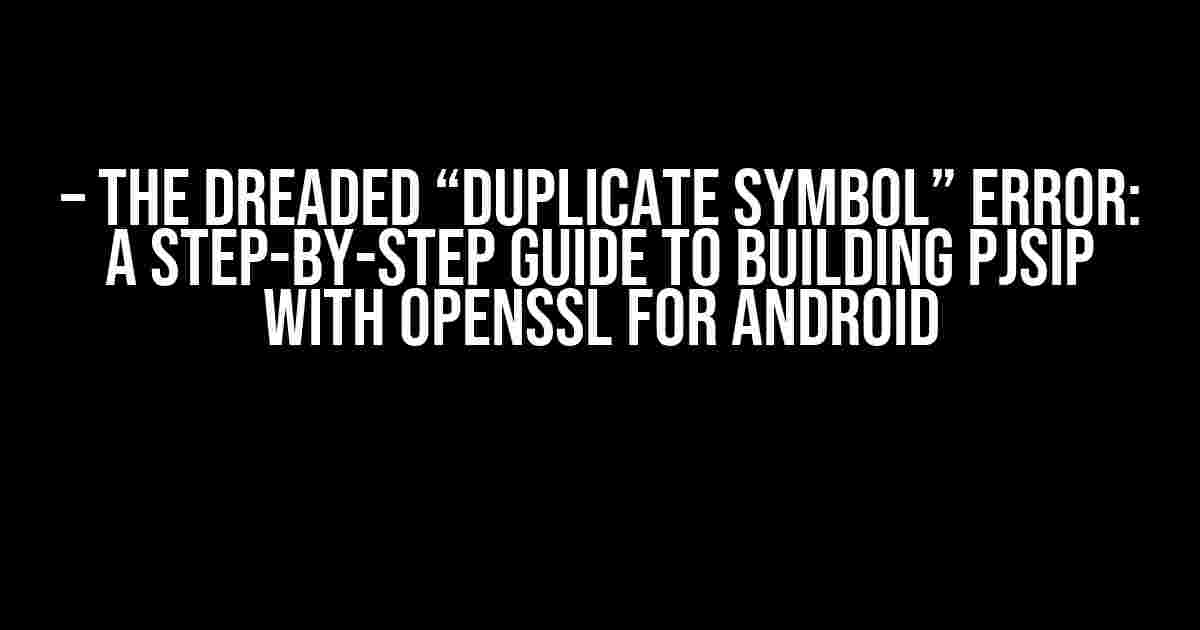Are you tired of encountering the frustrating “Duplicate symbol” error when building PJSIP with OpenSSL for Android? You’re not alone! Many developers have fallen victim to this pesky issue, but fear not, dear reader, for we’ve got you covered. In this comprehensive guide, we’ll walk you through the troubleshooting process, providing crystal-clear instructions and explanations to get you back on track in no time.
- What is the “Duplicate symbol” Error?
- Why Does it Happen with PJSIP and OpenSSL?
- Solution 1: Use the Correct OpenSSL Version
- Solution 2: Configure PJSIP to Use a Custom OpenSSL Installation
- Solution 3: Use the Android NDK’s BoringSSL instead of OpenSSL
- Solution 4: Use a PJSIP Version that’s Compatible with Android
- Additional Tips and Tricks
- Conclusion
What is the “Duplicate symbol” Error?
Why Does it Happen with PJSIP and OpenSSL?
PJSIP, a popular open-source SIP library, relies heavily on OpenSSL for its cryptographic needs. However, when building PJSIP for Android, the OpenSSL libraries can sometimes conflict with the system’s own SSL implementation, leading to the dreaded “Duplicate symbol” error. This error can manifest in various ways, such as:
- Multiple definitions of SSL/TLS functions
- Collisions between OpenSSL and Android’s BoringSSL
- Incompatible library versions
Solution 1: Use the Correct OpenSSL Version
One common culprit behind the “Duplicate symbol” error is an incompatible OpenSSL version. To avoid this, ensure you’re using a version of OpenSSL that’s compatible with your Android NDK. You can do this by:
- Checking the OpenSSL version used by PJSIP in the `pjlib/include/pj/ssl_sock.h` file
- Verifying the OpenSSL version installed on your system
- Updating your OpenSSL version to match the one required by PJSIP
$ openssl version OpenSSL 1.1.1 11 Sep 2018
Solution 2: Configure PJSIP to Use a Custom OpenSSL Installation
If you’re using a custom OpenSSL installation, you’ll need to configure PJSIP to use it instead of the system’s default OpenSSL. You can do this by:
- Specifying the custom OpenSSL installation path in your `Android.mk` file
- Defining the `OPENSSL_INC` and `OPENSSL_LIB` variables
- Passing the custom OpenSSL path to the `configure` script
# Android.mk LOCAL_PATH := $(call my-dir) include $(CLEAR_VARS) LOCAL_MODULE := openssl LOCAL_SRC_FILES := ../../../openssl.lib include $(BUILD_SHARED_LIBRARY) include $(CLEAR_VARS) LOCAL_MODULE := pjlib LOCAL_SRC_FILES := ../../../pjlib/libpjlib.a LOCAL_LDLIBS := -lssl -lcrypto -L$(LOCAL_PATH)/../openssl.lib LOCAL_C_INCLUDES := $(LOCAL_PATH)/../openssl.lib/include LOCAL_CFLAGS := -DHAVE_OPENSSL
Solution 3: Use the Android NDK’s BoringSSL instead of OpenSSL
Another approach is to use the Android NDK’s BoringSSL instead of OpenSSL. BoringSSL is a fork of OpenSSL that’s specifically designed for Android and provides better compatibility. To use BoringSSL, you’ll need to:
- Update your `Android.mk` file to use BoringSSL
- Define the `BORINGSSL_INC` and `BORINGSSL_LIB` variables
- Pass the BoringSSL path to the `configure` script
# Android.mk LOCAL_PATH := $(call my-dir) include $(CLEAR_VARS) LOCAL_MODULE := boringssl LOCAL_SRC_FILES := ../../../boringssl.lib include $(BUILD_SHARED_LIBRARY) include $(CLEAR_VARS) LOCAL_MODULE := pjlib LOCAL_SRC_FILES := ../../../pjlib/libpjlib.a LOCAL_LDLIBS := -lboringssl -lcrypto -L$(LOCAL_PATH)/../boringssl.lib LOCAL_C_INCLUDES := $(LOCAL_PATH)/../boringssl.lib/include LOCAL_CFLAGS := -DHAVE_BORINGSSL
Solution 4: Use a PJSIP Version that’s Compatible with Android
If all else fails, you might need to use a version of PJSIP that’s known to work with Android. You can try:
- Checking the PJSIP documentation for Android-specific instructions
- Using a PJSIP version that’s specifically designed for Android
- Consulting online forums and communities for Android-specific PJSIP builds
| PJSIP Version | Android Compatibility |
|---|---|
| PJSIP 2.8 | ✓ |
| PJSIP 2.9 | ✗ |
| PJSIP 2.10 | ✓ |
Additional Tips and Tricks
Here are some additional tips to help you troubleshoot the “Duplicate symbol” error:
- Use the `nm` command to inspect the symbol tables of your libraries
- Verify that your OpenSSL and PJSIP versions are compatible
- Check for any library conflicts or version mismatches
- Consult the PJSIP and OpenSSL documentation for Android-specific guidance
$ nm -D libssl.so | grep SSL
U SSL_CTX_free
U SSL_CTX_new
U SSL_accept
U SSL_connect
Conclusion
There you have it, folks! With these solutions and tips, you should be able to overcome the “Duplicate symbol” error and successfully build PJSIP with OpenSSL for Android. Remember to stay calm, patient, and methodical in your troubleshooting approach. Happy building!
By following this comprehensive guide, you’ll be well on your way to resolving the “Duplicate symbol” error and creating a robust, secure, and reliable PJSIP-based application for Android. So, what are you waiting for? Get building, and don’t let the “Duplicate symbol” error hold you back!
Frequently Asked Question
Are you tired of dealing with the infamous “Duplicate symbol” error when building PJSIP with OpenSSL for Android? Don’t worry, we’ve got you covered! Check out these FAQs to resolve the issue once and for all.
Q: What causes the “Duplicate symbol” error in PJSIP with OpenSSL for Android?
A: The “Duplicate symbol” error occurs when there are multiple definitions of the same symbol (function or variable) in the PJSIP library and OpenSSL. This can happen when the OpenSSL library is not properly configured or when there are conflicts between the PJSIP and OpenSSL versions.
Q: How can I resolve the “Duplicate symbol” error in PJSIP with OpenSSL for Android?
A: To resolve the error, try the following: update your OpenSSL version to the latest one, check the PJSIP configuration to ensure it’s pointing to the correct OpenSSL library, and verify that you’re not including duplicate OpenSSL libraries in your Android project.
Q: What is the importance of using the correct OpenSSL version with PJSIP for Android?
A: Using the correct OpenSSL version is crucial to avoid compatibility issues and ensure the security of your Android app. PJSIP relies on OpenSSL for encryption, so using an outdated or incompatible version can lead to errors, crashes, or even security vulnerabilities.
Q: Can I use a different encryption library instead of OpenSSL with PJSIP for Android?
A: Yes, you can use alternative encryption libraries like mbed TLS or GNU_tls. However, keep in mind that PJSIP has been optimized for OpenSSL, and using a different library might require additional configuration and testing to ensure compatibility and security.
Q: Are there any additional resources available to help me troubleshoot the “Duplicate symbol” error in PJSIP with OpenSSL for Android?
A: Yes, you can refer to the official PJSIP documentation, OpenSSL documentation, and Android developer forums for additional guidance and troubleshooting tips. You can also search for online tutorials, blogs, and community forums dedicated to PJSIP and OpenSSL development.


